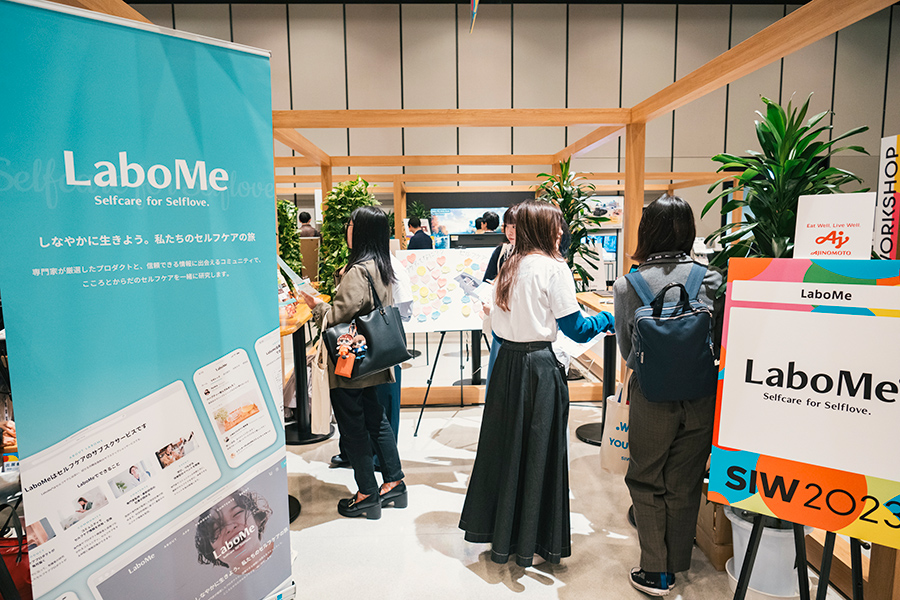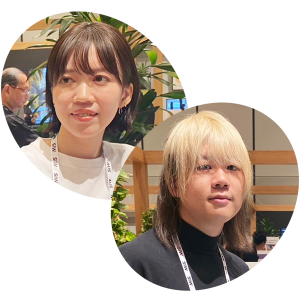渋谷未来デザインのインターン生がインタビュー取材を行なうシリーズ。今回は、11月6日〜13日まで1週間に渡り開催されたソーシャルイノベーションの祭典「SOCIAL INNOVATION WEEK(以下、SIW)」で、セミナー&ワークショップや展示ブースを展開した「LaboMe」の代表・橋さんにお話をうかがいました——

花田 まずはLaboMeについて簡単におしえていただけますか?
橋 LaboMeは、味の素の社内起業家育成プログラムで生まれたサービスで、女性のセルフケアに焦点を当て、私自身がPMSに悩んでいた経験をもとに、セルフケアのサブスクリプションサービスを提供しています。
月額2,980円でLaboMeの会員になっていただくと、まず一つは、毎月のテーマに基づいたセルフケアプロダクトが入ったサブスクリプションボックスが届きます。LaboMeは食、休息、美容、運動、温める、つながるという6つのテーマを設けてます。毎月テーマごとに異なるプロダクトをお届けしてます。例えば9月は、「美容」をテーマにサブテーマを「話すことから始めよう」とし、デリケートゾーンソープを皆さんにお届けしました。そして、このソープをきっかけに、普段なかなか話しにくいフェムケアについて、専門家や同じ悩みを抱える仲間と対話をするイベントも実施しました。

花田 確かに、フェムケアなどのセルフケアにはオープンな対話が必要ですね。LaboMeが提供する商品やイベントの中で、ユーザーはどのような経験をすることができるのでしょうか?
橋 LaboMeでは、商品提供だけでなく、その他、コミュニティも大切にしています。商品はきっかけとして機能し、開発者や専門家を招いたイベントや、オンラインのコミュニティ内での情報交換も行われます。
また、生活習慣やセルフケアの研究や知見が豊富な味の素の研究員がコミュニティに参加し、ユーザーの疑問に答えたり、お悩みを解決するサポートも行っています。
花田 商品提供だけでなくコミュニティやイベントを通じて、ユーザー同士が助け合いながらセルフケアを進めることができるのですね。
橋 そうです。実際に、今回のSIWでは来場された皆さんに「セルフケアって何?」や「セルフケアでのお困りごと」を付箋に書いてもらい、ブース内で共有しています。

橋 これを見ると、セルフケアに関する悩みや希望が多岐にわたっていることがよくわかります。LaboMeは、これからもユーザーの皆さんとの対話を大切にしながら、より良いセルフケアの未来を共に築いていくために、単なる商品提供ではなく最適なセルフケアを見つけていくお手伝いをしたいと考えています。
花田 SIWへの参加のきかっけについても教えていただきたいです。
橋 SIWの趣旨にとても共感し、社会課題に対してアイデアを出し合う場として参加しました。個人の責任として捉えられがちな女性のPMSやお悩みに対して「自己責任」で片付けずに、「そういう揺らぎがある中で暮らしやすい社会をつくろうよ」と、社会に向けてメッセージを発したいなと思っていたので、SIWはぴったりだなと思いました。
セミナー&ワークショップでは、「セルフケアって何?」をテーマに、女性の悩みやメンタルケアについて話し合いました。中学生から大学生、その他幅広い世代の方々が参加してくださったのも印象的でした。
花田 僕みたいな男性の参加者もいましたか?

橋 はい、ワークショップにも展示ブースにも、いらっしゃいましたよ。LaboMeは女性向けのサービスではありますが、今回、男性のお客様とお話しして、セルフケアについて男性目線ならではのお悩みなどをお伺いすることができ、我々もたくさんの気付きがありました。男性も含めてオープンにアイデアが交換ができるSIWだからこそ聞けたお話で、個人的にもとても印象的でした。
その他にも、学生さんや様々な世代のお客様にお越しいただきました。たとえば中学生の方が、授業の忙しさでメンタルの揺らぎに悩んでいたり、セルフケアの必要性を感じている方の多さにあらためて気付かされました。
また、皆さんにセルフケアについて付箋に書いて貼っていただいたボードを眺めてみると、その多様さにも気付きます。みんながどういうときに心地よくいられるのかを知ることはとても大事だなとも思いました。
花田 確かにそうですね。自分と向き合い、また、まわりの人たちとも向き合いながら考えていくことが必要だなと思いました。最後にSIWでの気付きを踏まえて、今後の展望を教えてください。
橋 今回、皆さんと対話することの大切さを強く感じました。自分自身を研究するということは、自分とだけ向き合うことではなくて、いろんな人と対話をしながら自分のことを知っていくことなんだとSIWを通じてあらためて実感しましたね。これを踏まえて、LaboMeの中でももっと対話的なイベントやプログラムをつくりたいですし、そこに男性の方や、あるいは学生の方だったり、これからもまた多様な方たちと一緒にアイデア交換をしたいとって思います。
花田 多様な人たちと交流して、自分のことをアウトプットしていくことで、逆に自分のことをまとめていけるというような、自己への気付きみたいなものがセルフケアに繋がっていくのかなと感じました。今日はありがとうございました。
橋 ありがとうございました。

LaboMe
https://labo-me.jp/
Instagram
https://www.instagram.com/labome_official/



